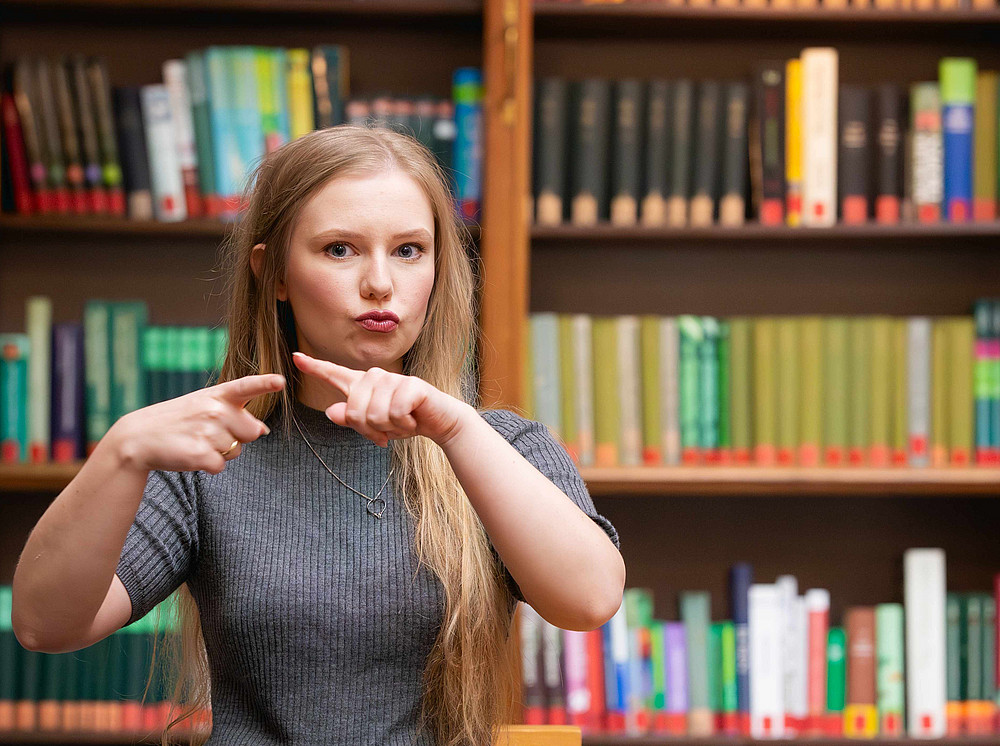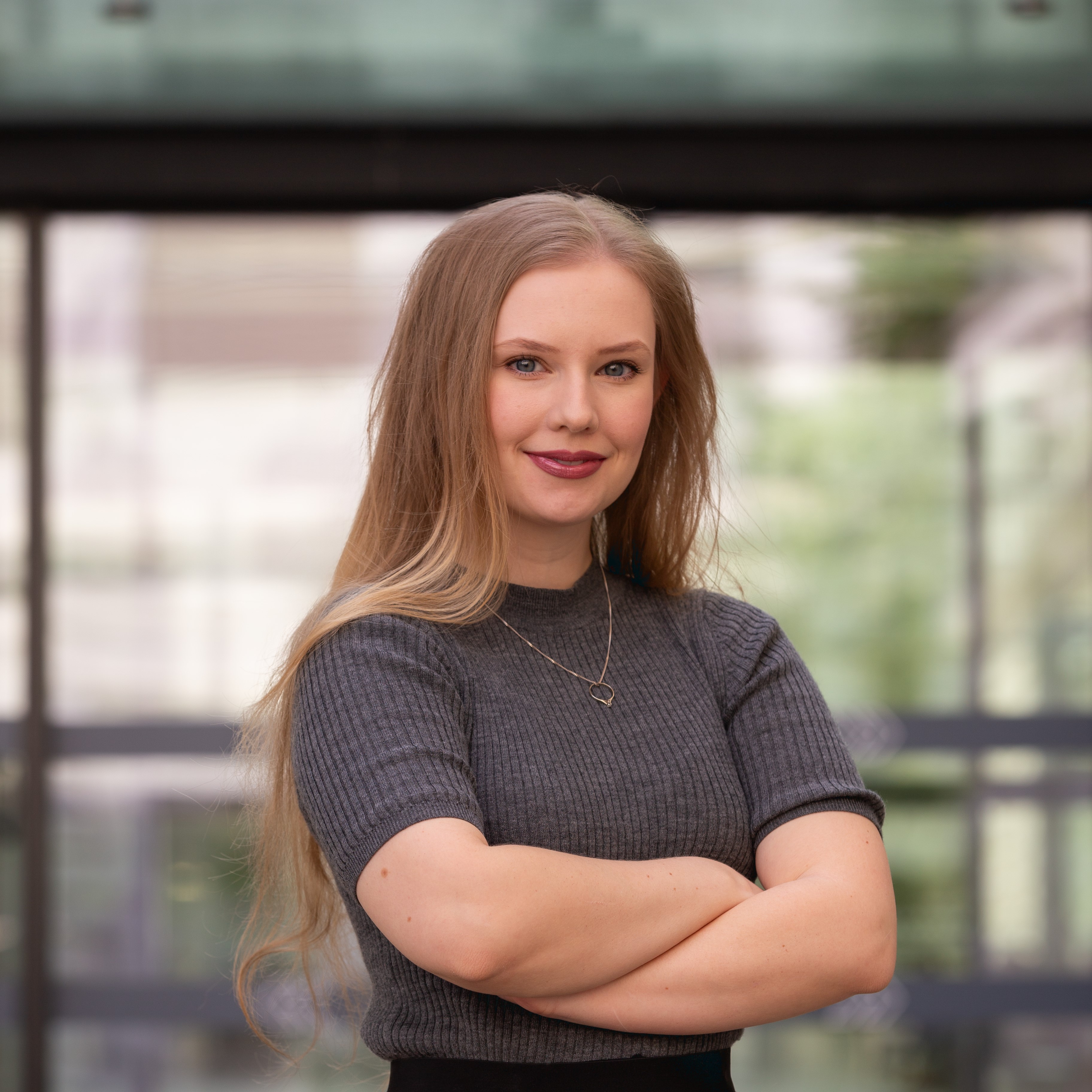"You don't need to go to Panama to immerse yourself in a foreign world!"

How do deaf migrants communicate in Austria? Linguist and sign language researcher Julia Gspandl looked into this question in her dissertation. And found out some surprising things.
"How do deaf migrants learn Austrian sign language? That was the fundamental question for me," says Julia Gspandl from "treffpunkt sprachen" at the University of Graz. Her dissertation on this topic was recently approved. The title: "The languaging practices and competencies of deaf migrants in Austria". She interviewed 12 adult migrants. They have all been living in Graz for at least four months and at most 22 years. Four of them had fled, the others migrated to Austria for various reasons. "Because of love, for example," says the young linguist, who came into contact with sign language research by chance. "Somehow I slipped into it - through a friend who was involved with deaf people. I was so fascinated by sign language that I attended my first language course at 'treffpunkt sprachen'." During her studies in linguistics, this fascination eventually turned into a specialization. "The social element of minority languages really appealed to me," says Julia Gspandl.
The young researcher derives the answers to her central question from the research she carried out as part of her dissertation. "Many factors play a role. For example, migrants mix signs from their countries of origin into Austrian sign language. Or they invent new signs out of context."
Julia Gspandl is a member of the Future Education research network in the cluster "Languages as a tool for social participation".
This is because, contrary to popular belief, sign languages are not uniform throughout the world; just like spoken languages, there are dialects as well as foreign languages. According to Julia Gspandl, how difficult it is to learn a second sign language depends on the personal starting point. For example, someone who comes to Austria from Germany will find it easier to learn Austrian sign language than if their original language is Japanese sign language. Learning another sign language is similar to learning a new foreign language in spoken language. "Sign languages are similarly complex, similarly different and similarly difficult to learn as spoken languages," emphasizes Julia Gspandl.

Migrants do not usually learn Austrian sign language in language courses - not one of the interviewees had attended one - but in their private environment. "They learn a lot from their friends, from their partners and from their children, who bring Austrian sign language home from school."
A key - and perhaps the most surprising - finding from her dissertation related to the age of first language acquisition. "The prevailing theory in research is that the age at which you learn your first sign language influences how well you learn other sign languages. However, this theory was not confirmed in this study," emphasizes Julia Gspandl. "It could be that whether you have ever learned another sign language before is more important for second sign language acquisition than how early you started. The age at which you learn your first sign language as a child does have an influence on how well you master this first language. But not how well you learn other sign languages as an adult."
It has been shown that people who have more experience in signing in international settings also learn Austrian sign language more easily. "The interviewees had a higher level of competence than expected. They learn Austrian sign language very well. This can possibly be attributed to the fact that they already had links to their first sign language."
These findings show how important it is for deaf children to attend a school for the deaf. "The more sign language input the deaf participants received from their friends as a child, the higher their competence in Austrian sign language in the long term." It is certainly important for social and cognitive development, among other things, when hearing parents of deaf children learn sign language and teach it to their children. "But especially when it comes to later foreign language skills, school could be much more important in this respect," says Julia Gspandl.
The same applies to adulthood. Here, the working environment has a major influence on language skills. "Deaf migrants who can sign at work because they are supported by interpreters or have deaf colleagues, for example, sign Austrian Sign Language much better than those who don't have this opportunity."
Julia Gspandl is also able to integrate these findings into her everyday professional life. At the company "capito", which translates texts into easy-to-understand language, she is involved in the development of various products. "There is already a connection in terms of content between international deaf communication and easy-to-understand language," she explains. "You can learn a lot from deaf people in such settings about how to structure information in an understandable way. For example, what information do I introduce first, and how, to make it easier to understand? Or: How can I combine different terms and examples to create more clarity?" And, of course, knowledge of how deaf migrants communicate is relevant when it comes to creating texts specifically for this target group.

Julia Gspandl was also surprised by how quickly migrants learn the new language and thus make themselves independent of their environment. With one interviewee, for example, she observed that he got up from his chair, walked to a table and pointed to the tabletop to express "wood" - in such a way that it became clear from the context that he could not mean anything else, but that he did not know the ÖGS sign for "wood". "This creative use of language, in which the speaker leaves the usual sign language space to make himself understood, stops surprisingly quickly." Such figurative signs, which are based on the immediate environment, are no longer necessary as soon as the use of language becomes more efficient. "The deaf community with its sign language is simply exciting. It's a completely different world," emphasizes Julia Gspandl. "You don't need to go to Panama to immerse yourself in a foreign world. You can do it in Graz too!"
Her greatest wish at the moment? "To stay in research. There are still so many unanswered questions!"
